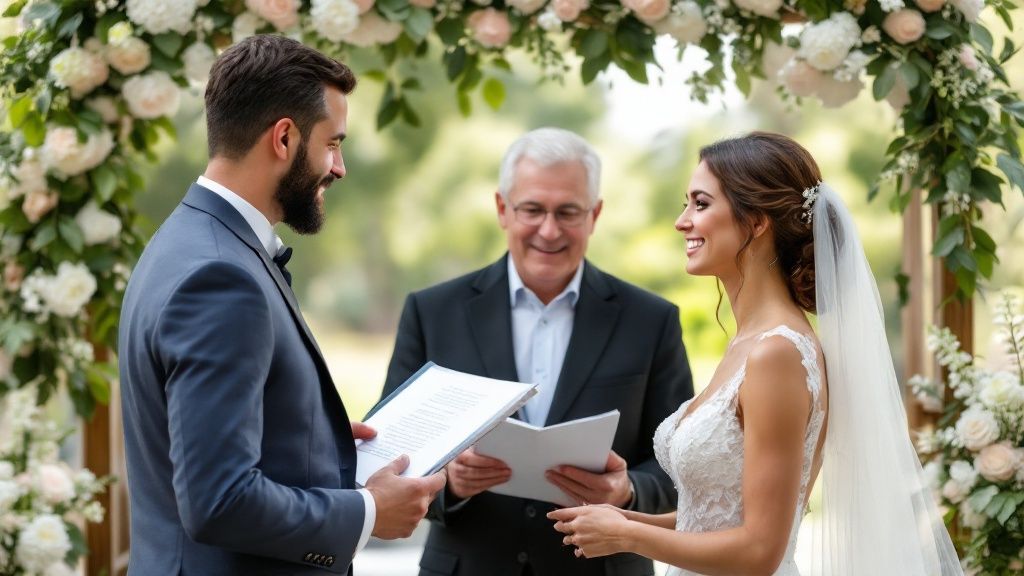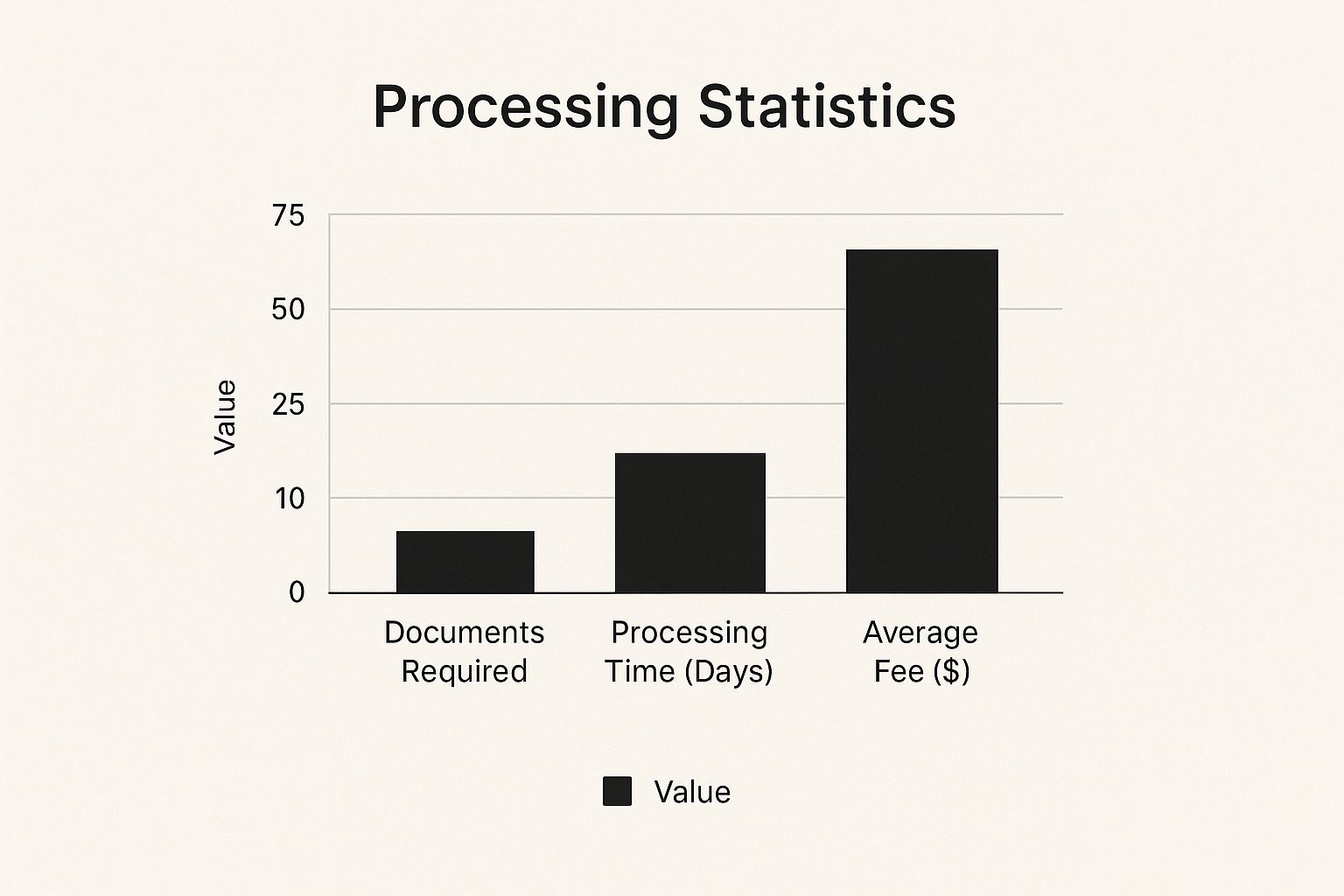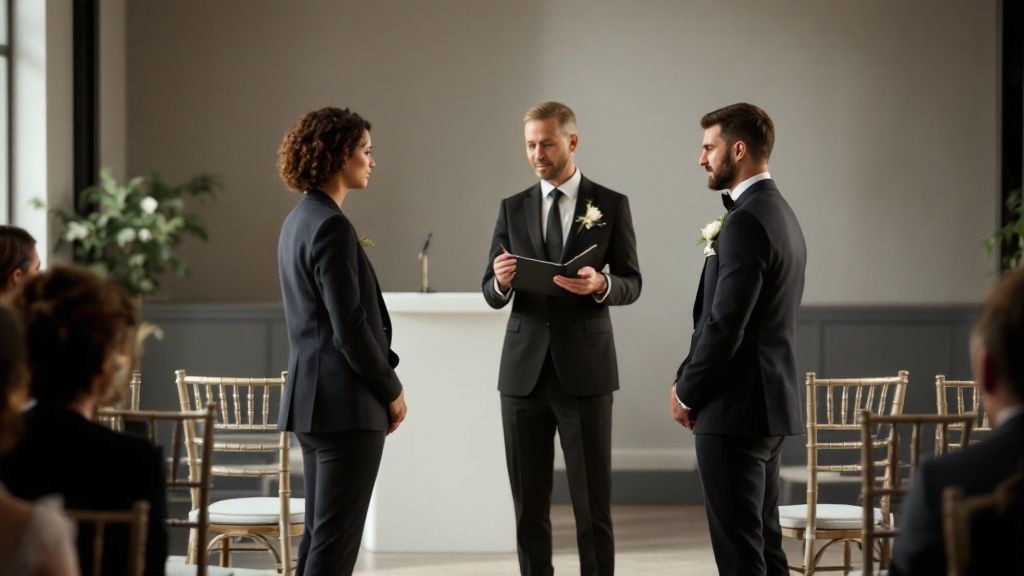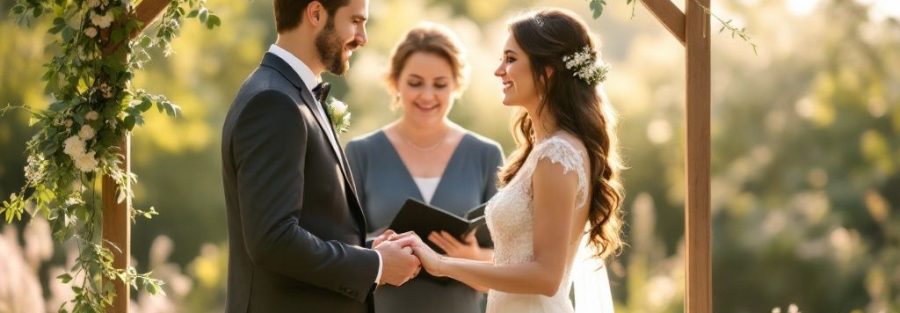The Crucial Role Your Wedding Officiant Really Plays

Your wedding officiant does so much more than just make your marriage legal. Think of them as the storyteller of your unique love story, the conductor of all the emotions that make your ceremony special. Their influence goes way beyond just saying "I do," shaping the entire feel and experience of this big moment. This means finding the right officiant is a decision worth really thinking about.
More Than Just a Script: The Officiant's Influence
The wedding officiant wears several important hats. A big one is crafting the story of your ceremony. This means working closely with you to understand what you want, your values, and the history of your relationship. They help you pick readings, write personalized vows, and design a ceremony that truly reflects your love.
A skilled officiant also guides those important pre-wedding chats. This might involve premarital counseling or just talking about what you both expect from the ceremony and married life. They can help you navigate tricky conversations, making sure you're both on the same page.
But it's not all about emotions! Your officiant is also in charge of the legal stuff. This includes making sure all the paperwork is filled out correctly and filed on time, so your marriage is actually official. Beyond the legalities, they're the ones who create those special moments that make your ceremony unforgettable.
From the tone of their voice to how they connect with you and your guests, a great officiant knows how to create an atmosphere of joy, love, and celebration.
For example, picture an officiant who smoothly brings in a surprise performance by a family member or tells a funny story about the couple that has everyone laughing. These little touches are what turn a typical ceremony into something really special.
Different Officiant Types: Unique Energies and Styles
The type of officiant you pick has a big impact on the overall vibe of your ceremony. Religious leaders bring a sense of tradition and spiritual guidance. Celebrants offer more flexibility for making the ceremony personal. Civil officials give you a more formal, legal-focused approach. And choosing a loved one adds a really personal touch. Each one brings something different to the table. You might be interested in: Our sitemap.
- Religious Leaders: Often follow specific religious traditions and customs.
- Celebrants: Focus on making personalized ceremonies that reflect your values and beliefs.
- Civil Officials: Conduct legally binding ceremonies, often at a courthouse.
- Loved Ones: Can make your ceremony deeply personal and intimate.
In 2025, celebrant-led weddings have become super popular worldwide, showing a move toward personalized ceremonies. According to The Celebrant Directory, searches for celebrant weddings went up by 21.92% in 2024, and demand is still growing in 2025. This shows how much couples want a ceremony that's unique to them. Find more stats here: The Celebrant Directory's Report on 2025 Wedding Trends. For pricing and service structure, learn how to create a productized service.
Choosing your officiant deserves way more attention than most couples give it at first. It's not just about who'll say the legal words but about who'll help you create a ceremony that truly reflects your love story. The officiant sets the tone for the whole day, affecting not just the ceremony itself but also the overall feeling of your wedding. By carefully considering the role you want your officiant to play, you can make sure your wedding day is not only legally sound but also deeply meaningful and unforgettable.
Religious vs. Civil Officiants: Finding Your Perfect Match
Picking the right officiant is a big deal for your wedding. They set the mood for the whole ceremony. It's not just about making it legal; it's about finding someone who gets your style as a couple. This means deciding if a religious officiant or a civil officiant/celebrant is a better fit for your love story.
Understanding the Differences: Tradition vs. Doing Your Own Thing
Religious officiants, like priests, rabbis, or imams, usually follow specific traditions. This can feel comfortable and structured, especially if you're both religious. Think of a Catholic wedding mass – there are certain prayers and rituals that are always part of it. Plus, religious officiants sometimes do premarital counseling, which can be helpful for couples starting their married life within their faith.
But if you want a more personalized ceremony, a civil officiant or celebrant might be perfect. They give you more freedom to create a ceremony that reflects your values and beliefs. They can include non-traditional stuff, like readings from your favorite poems, special rituals, or even some humor. This lets you build a ceremony that feels truly you.
Navigating Family and Mixed Faiths
Choosing between a religious and civil officiant can lead to some tricky talks with family, particularly if they have different expectations or mixed religious backgrounds. Talking openly and finding common ground is key. Some couples blend elements from both traditions to honor everyone's beliefs. Check out some examples: Our portfolio.
Global Trends and Keeping it Affordable
Even global trends affect officiant choices. The 2025 Global Wedding Market Report shows people are choosing all sorts of officiants in different places. Find more detailed statistics here. This shows growing acceptance of different officiant types, making ceremonies more personal and inclusive. And, of course, budget matters! Especially in some areas, the cost can influence the decision.
Visualizing the Key Differences: A Data Chart Breakdown
To help you see the differences, this data chart compares religious and civil officiants across important factors:

The data chart highlights the different approaches. Religious officiants tend to be more traditional and faith-focused. Civil officiants/celebrants offer greater flexibility and personalization. Cost varies widely for both depending on experience, location, and what they offer. Understanding these differences helps you choose what's right for your wedding vision.
To help you further compare, here's a handy table:
Religious vs. Civil Wedding Officiants Comparison: A comprehensive comparison between religious and civil officiants across key decision factors for couples planning their ceremony.
| Consideration | Religious Officiant | Civil Officiant/Celebrant |
|---|---|---|
| Level of Tradition | High | Low |
| Flexibility | Low | High |
| Religious Focus | High | Low |
| Personalization | Low | High |
| Cost | Varies | Varies |
This table clearly shows the core differences between the two types of officiants. Knowing these pros and cons makes it easier to pick someone who fits your wedding style! See more about our services: Our sitemap.
Finding a Wedding Officiant Who Gets Your Vision

Finding the perfect wedding officiant isn't like ordering takeout; it's about finding someone who really gets your vision. Forget generic online searches. We're talking about connecting with someone who vibes with your style and values, a true partner in crafting your special day. This section will give you the tools you need to find that perfect fit.
Targeted Strategies for Finding the Right Fit
Think of your officiant as a missing puzzle piece. You need a targeted approach to find them. Start by asking friends and family for recommendations. Personal referrals can offer amazing insights and point you toward officiants with a proven track record. Also, check out wedding blogs and websites. Many feature officiant profiles, giving you a sneak peek into their style and experience. Wedding-focused social media platforms can also be treasure troves of information.
Imagine scrolling through Instagram and finding an officiant whose ceremonies perfectly match the vibe you're dreaming of. That's the power of targeted searching! It helps you uncover hidden gems you might miss otherwise. For even more resources, check out: Our category sitemap.
Key Questions to Ask During Interviews
Once you have some potential officiants, the interview process is super important. Don't just listen to their pre-planned spiel; ask smart questions to see their real approach. Ask how they handle curveballs, like a sudden downpour or a late guest. This shows you their problem-solving skills. Also, find out how they incorporate cultural elements or family dynamics. A great officiant can blend traditions and personalities seamlessly.
Don't forget to ask about their process for personalized vows and ceremonies. Do they have templates, or are they open to creating something totally unique? This shows their flexibility and how willing they are to collaborate. Asking these targeted questions will help you figure out if an officiant really understands you and can bring your vision to life.
Red Flags to Watch Out For
Enthusiasm is great, but watch out for red flags. Communication is key. Slow responses or vague answers could mean they're disorganized. On the flip side, being too stuck to pre-written scripts can also be a problem if you want a personalized ceremony. That lack of flexibility can make it hard to create a ceremony that feels authentic.
Another red flag is a lack of genuine interest in your story. An officiant who doesn't take the time to get to know you and your relationship might not be the right fit. And finally, trust your gut. If something feels off, it probably is. Finding the right officiant isn't just about logistics; it's about connecting with someone on a personal level.
The Importance of Timing and the Global Landscape
Timing is everything! Ideally, start your officiant search 8-10 months before your wedding. This gives you plenty of time to interview several candidates and lock down your top choice. It's interesting to note that the demand for wedding officiants is actually affected by global trends. The Asia-Pacific region dominates the global wedding service market, which has a big impact on officiant demand. Find more detailed statistics here.
By using these strategies and watching out for red flags, you can find an officiant who does more than just the legal stuff. They'll be a true partner in creating a ceremony that reflects your unique love story. This thoughtful selection process ensures your ceremony isn't just a formality, but a truly memorable and meaningful experience.
Crafting Your Dream Ceremony With Your Officiant
Saying "yes" is just the first step. There's a whole journey between that and "I do," and it’s more than just picking a venue and a dress. The core of your wedding, the ceremony, needs some serious teamwork with your wedding officiant. This is how you transform your love story into something real and unforgettable. So, let's talk about crafting a ceremony that’s truly you.
Communicating Your Vision: From Inspiration to Reality
Think of your ceremony as a blank canvas. Your officiant is like your artistic guide, helping you bring your vision to life. Talking openly is key. Share your dreams, what inspires you, and even any worries you have. Are you thinking classic and traditional or something more modern? Any special readings, rituals, or cultural elements you want to include? Some couples love the unity candle ceremony, while others prefer a sand ceremony or a wine box ceremony. The more details you share, the better your officiant can understand what you want and help you create a ceremony that reflects you as a couple.
Working with Your Officiant: Creating Flow and Meaning
A good officiant is way more than just someone who reads a script. They’re pros at creating an emotional journey and keeping your guests engaged. They know how to build anticipation and create moments that will make you laugh and cry. They might suggest ways to weave in personal stories that resonate with you and your guests. Or they can help you pick readings that complement your love story and bring a sense of togetherness and celebration. Think of them as your ceremony director, making sure everything flows smoothly and meaningfully.
Adding Personal Touches: Making it Uniquely Yours
Your ceremony should feel personal and unique. This means adding those little (or big!) things that reflect you and your journey together. Maybe it's a subtle nod to your history, like a reading from your favorite book or a song that's special to you. Or, perhaps you want to make a bolder statement, like including cultural traditions or writing your own vows. From handfasting to jumping the broom, there are so many possibilities. Your officiant can help you brainstorm and make sure these personal touches enhance your ceremony without making things complicated.
Navigating Challenges: Finding the Right Balance
Planning a wedding can sometimes mean dealing with family dynamics and balancing personal values with traditions. Maybe one family prefers a traditional religious ceremony, while the other wants something more non-denominational. This is where your officiant's experience is invaluable. They can help you find common ground and create a ceremony that respects everyone's beliefs. They've helped tons of couples through these tricky situations and can offer solutions, even for the most sensitive challenges.
Wedding Ceremony Elements & Customization Options
To help you visualize how you can personalize your ceremony, check out this table:
| Ceremony Element | Traditional Approach | Modern/Personalized Options | Average Duration |
|---|---|---|---|
| Processional | Bridal party walks down the aisle to traditional music | Unique music choices, non-traditional processional order (e.g., couple walks down together) | 5-10 minutes |
| Welcome/Opening Remarks | Formal greeting and introduction | Personalized welcome incorporating couple's story or a special message | 2-5 minutes |
| Readings | Religious texts or classic poetry | Song lyrics, excerpts from favorite books, letters from loved ones | 3-7 minutes |
| Vows | Traditional, repeated vows | Personalized vows, written by the couple or adapted from existing examples | 5-10 minutes |
| Ring Exchange | Simple exchange with standard wording | Personalized exchange with heartfelt expressions of commitment | 3-5 minutes |
| Unity Ceremony | Unity candle | Sand ceremony, wine box ceremony, handfasting, tree planting | 5-7 minutes |
| Pronouncement | Formal declaration of marriage | Creative and personalized pronouncements | 1-2 minutes |
| Recessional | Couple walks back down the aisle as newlyweds | Upbeat music choices, celebratory exit (e.g., confetti, bubbles) | 2-5 minutes |
Working closely with your officiant makes your ceremony more than just a formality; it becomes a truly unforgettable moment. It’s about more than just saying "I do"—it’s about creating a memory that reflects your love story and celebrates the start of your life together. This collaboration ensures your ceremony is not just beautiful, but deeply meaningful.
The Legal Side of Wedding Officiants: What You Must Know

Making sure your wedding is legally binding is just as important as the ceremony itself. This means understanding the legalities around wedding officiants. This section helps clear up who can perform a beautiful ceremony and who can actually make your marriage official.
Ceremonial Vs. Legally Authorized Officiants
A ceremonial officiant is all about the emotional impact of your ceremony. They'll craft personalized vows, tell your love story, and create a truly memorable experience. But, they might not have the legal power to actually marry you. A legally authorized officiant, however, has met all the legal requirements in your area to perform marriages. This difference is super important for your marriage to be legally valid.
Think of it this way: a friend ordained online might create a beautiful ceremony, but if they aren't legally recognized by your state or county, your marriage won’t be official. This can cause some serious complications later on.
Common Legal Pitfalls and How to Avoid Them
There are a few legal traps that can make a marriage invalid. One common mistake is not getting the right marriage license in time. Also, using an officiant who isn't legally recognized where you're getting married is a big no-no. Destination weddings can be tricky, as each location has different rules.
To avoid these issues, research the marriage license and officiant requirements for your state. Double-check your officiant's credentials and make sure they’re licensed in your wedding location. Lots of couples hire professionals to capture their big day. If that's you, you might want to check out video laten maken.
Jurisdiction-Specific Timelines and Requirements
Marriage license rules are different everywhere. Some states require a waiting period between getting the license and the ceremony, while others don't. The license might also only be valid for a certain amount of time. Missing these small details can cause major headaches. Check your local county clerk's website or talk to a wedding planner for the specifics. Our case studies might also be helpful.
Verifying Credentials and Licensing Limitations
Don’t be shy about asking your officiant for proof of their credentials. You have the right to be sure they're legally allowed to perform your ceremony. Keep in mind that some officiants might have licensing limitations based on location or religious affiliation. This means they might not be able to marry you if they don't have the right credentials or religious approvals for your specific wedding location.
Ensuring Your Ceremony Is Both Legal and Meaningful
By understanding the legal side of wedding officiants, you can make sure your ceremony is both official and deeply personal. Verify credentials, research local requirements, and choose a legally authorized officiant. That way, you know your marriage is valid, while still having a personalized and meaningful ceremony. This careful planning lets you focus on celebrating your love story, knowing all the legal details are taken care of.
What Wedding Officiants Really Cost (And Why)
Picking the right person to officiate your wedding is a big deal, and figuring out how much it'll cost is key to planning your budget. There's more to it than just the initial fee, so understanding what affects the final price can help you make smart choices. Let's break down the costs involved in officiating, so you can see why prices vary and how to save money without sacrificing quality.
Decoding the Officiant Fee: More Than Meets the Eye
An officiant's fee isn't just for the ceremony itself. It covers their expertise, the time they put in, and their commitment to making your wedding special. This includes those first consultations, customizing the ceremony, pre-wedding meetings, rehearsal guidance, travel, and, of course, actually performing the ceremony. Think of it like this: you're paying for all the work they do behind the scenes to create a seamless and meaningful experience, not just them showing up on the day.
Typical Price Ranges and Regional Variations
Officiant fees can vary quite a bit depending on their experience, where you're getting married, and the kind of ceremony you want. Someone just starting out might charge between $200 and $500, while seasoned pros with years of experience might charge upwards of $1,000. Location matters too. Officiants in big cities often charge more than those in smaller towns. For example, an officiant in New York City is likely to charge more than one in rural Kansas. This is because of differences in the cost of living and what the market will bear. The type of ceremony also matters. A short and sweet ceremony will usually cost less than a personalized one with special rituals and readings.
Customization and Add-On Services: Understanding the Extras
Many officiants offer extra services or ways to customize the ceremony, which can change the total cost. These could include premarital counseling, help with writing your vows, or including special cultural traditions. For example, if you want a handfasting ceremony, there might be an extra fee. Talk about these options upfront and make sure you understand how they’ll affect the final price, so there are no surprises later.
Hidden Value Factors: Why a Higher Price Can Be a Better Investment
While sticking to your budget is important, a higher officiant fee can be worth it. An experienced officiant brings professionalism, expertise, and peace of mind – all invaluable on your big day. They're good at handling unexpected issues, managing all the moving parts, and creating a smooth and meaningful ceremony. This can really reduce stress and make the experience better for everyone.
Ethical Money-Saving Strategies: Getting the Best Value
You can definitely save money without compromising on the quality of your ceremony. Booking your officiant early often gets you a better rate, as does choosing a less popular date or time. Negotiating package deals or considering newer (but talented) officiants can also help. Check out our guide on archiving past blog posts for more helpful tips. Another option is asking a friend or family member to get ordained, which can significantly lower costs. Just make sure you check the legal requirements and that they’re comfortable leading the ceremony.
By understanding what goes into officiant pricing, you can make decisions that work for your budget and your dream ceremony. Investing in a skilled and experienced officiant can truly make your wedding day memorable and meaningful.
Ready to create an unforgettable wedding? Contact 1021 Events today to explore our services, from professional DJ and MC services to awesome visual effects and drone coverage. We can help turn your special moments into lasting memories. Visit 1021 Events to learn more.




